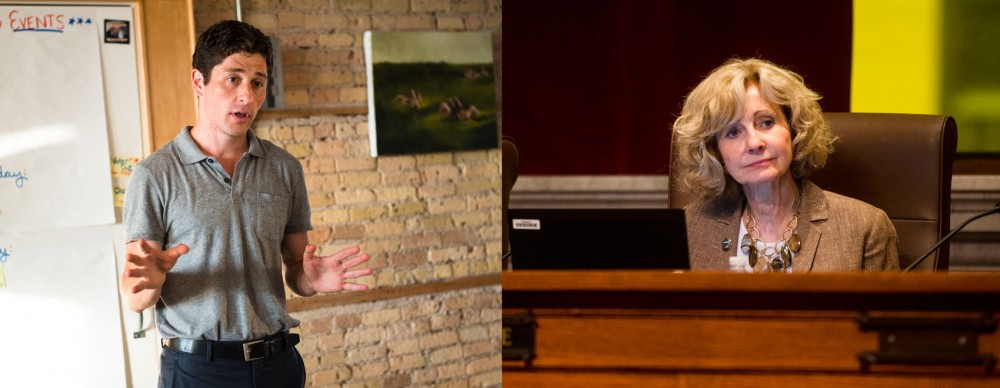Months after the Democratic-Farmer-Labor party endorsed attorney Jacob Frey, he and incumbent Diane Hofstede are still vigorously, but quietly, campaigning to represent the University of Minnesota area on the Minneapolis City Council.
Though Frey nabbed the party’s endorsement in May, he’s working on building the name recognition necessary to unseat Hofstede, who promises to run a campaign similar to past years.
As the 2013 election nears, Frey is tapering off his work schedule at Minneapolis law firm Halunen & Associates to campaign for the Ward 3 seat.
He instead favors spending more time at his loft in Northeast Minneapolis, which now serves as campaign headquarters for the estimated 650 “happy warriors” working on his campaign.
Meanwhile, seven-year incumbent Hofstede is simultaneously campaigning and working full time as the city councilwoman for the area that includes the Marcy-Holmes and Dinkytown neighborhoods.
Her campaign is different. As a “public servant,” Hofstede says she’s always involved with constituents — not just during the election cycle.
“Campaigning and door-knocking are things I do all the time,” she said.
Though both candidates are running with similar Democratic platforms in a decidedly liberal area, key differences in their positions lead to contrasting campaigns.
Frey: transitioning to campaigning full-time
The Frey campaign is stationed out of his apartment in Northeast Minneapolis. The loft is filled with campaign posters and a large calendar outlining the week’s events.
On Monday night, a group of volunteers gathered in Frey’s living room to plan the third annual Big Gay Race, an event that raises money for gay rights activist group Minnesotans United For All Families and that Frey has helped organize since its first year.
A cat walked around the room as Frey offered his guests beer and pizza, taking an informal tone with them, something campaign field director Margaret Zadra said is common.
“It’s very rare that you meet somebody who is authentic and capable,” Zadra said of Frey.
The Big Gay Race isn’t an official campaign event, but his supporters are expected to have a large turnout.
Frey’s campaign has made an effort to engage the Ward 3 community, especially students.
Recent political science graduate Laura Hoffman works as the campaign’s deputy field director. As a student at the University, Hoffman said she wasn’t interested in city politics because she thought the national level was what really mattered.
But when Hoffman began to get involved with Frey’s campaign, she said, she found city government to be more accessible and satisfying.
“It’s not all about Republican vs. Democrat,” she said. “It’s about getting the pothole on your street fixed or getting the garbage down the block picked up.”
His campaign’s student engagement efforts went as far as creating a registered University student group, Students for Jacob Frey, which Hoffman helped start.
Hofstede: ongoing outreach
Hofstede’s full-time job at City Hall makes her campaign tactics different, but that doesn’t stop her from doing outreach work.
As councilwoman, she attends many neighborhood meetings and community events in the 3rd Ward to talk to constituents and prospective voters, she said, while also working on city council projects that affect them.
The extensive outreach involved with an election cycle is nothing new to Hofstede.
“For me as a policymaker,” she said, “the most important part of that is going out and talking with the community.”
The Minnesota Daily previously reported that Frey had hoped Hofstede would end up supporting his campaign after the DFL endorsement, but the councilwoman is still running the “very robust campaign” she always has, she said.
Though she doesn’t have the resources that come with the DFL nod, Hofstede gained some prominent endorsements, including former U.S. Vice President Walter Mondale and City Council President Barb Johnson.
Like her competitor, much of Hofstede’s engagement efforts focus on students.
When talking to students, she said one issue stands out: “Their No. 1 concern is public safety.”
The councilwoman said she aims to address this issue by educating students on safety risks, how to prevent them and how to report their concerns.
She also said she helped implement a policy that brings city and University officials together twice a year to talk about public safety.
“The idea and the goal [of public safety initiatives] is to make everybody successful,” she said.
Hofstede said she’s impressed with University student engagement in city government, and added that that she’s had University students work as interns in her office.
While in office, Hofstede has helped establish programs like the University District Alliance and Pack and Give Back, which helps students recycle goods on move-in and move-out days.
Pack and Give Back was established after an old moving day program lost its funding, said former Graduate and Professional Student Assembly member Chet Bodin.
When the program stopped, Bodin said it caused friction between students and permanent residents in University neighborhoods because students would sometimes leave a mess when they left a property.
Bodin, a Hofstede supporter, said the councilwoman acts as a facilitator between students and permanent residents.
“I think that sometimes she’s in a difficult spot with the UDA,” he said, “because there’s a lot of people that get upset with the city, so she gets stuck in the middle.”
Hofstede said she plans to continue the program this fall and manage it better to get more students to recycle.
Hofstede said sustainability and environmental issues are of special importance to student constituents. She looks forward to hearings discussing the possibility of Minneapolis forming a municipal power utility next month, which councilmembers tout as a way to set sustainable and affordable energy goals for the city.








